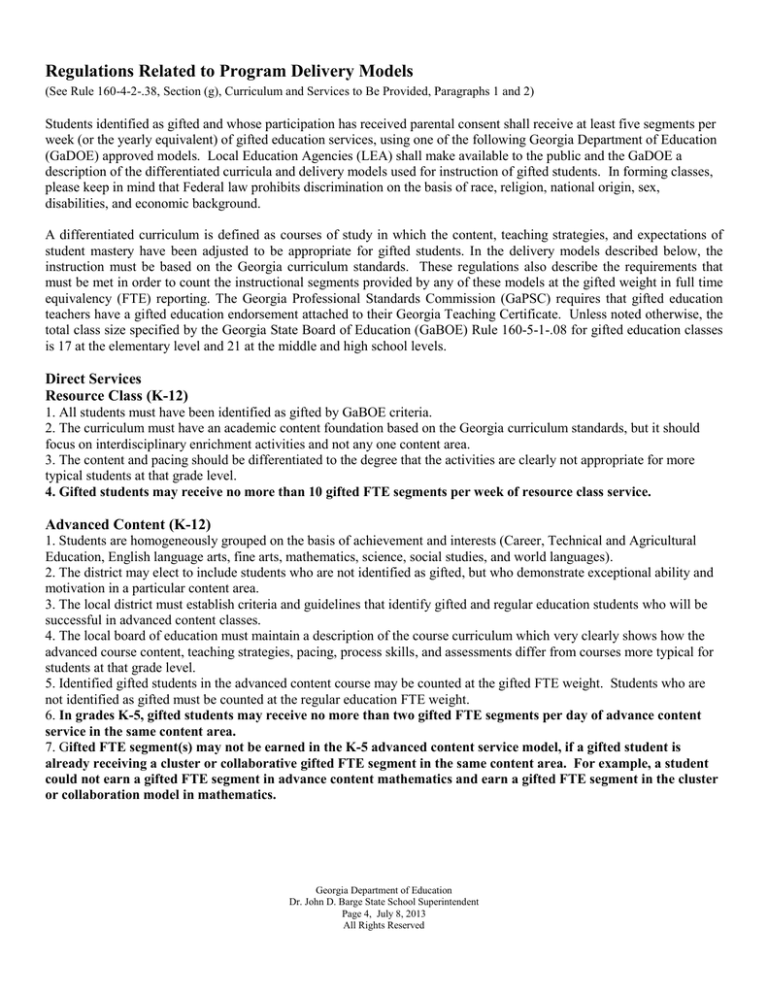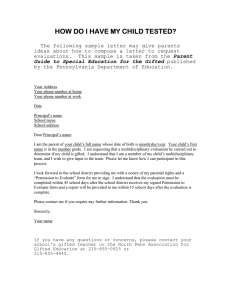
Regulations Related to Program Delivery Models
(See Rule 160-4-2-.38, Section (g), Curriculum and Services to Be Provided, Paragraphs 1 and 2)
Students identified as gifted and whose participation has received parental consent shall receive at least five segments per
week (or the yearly equivalent) of gifted education services, using one of the following Georgia Department of Education
(GaDOE) approved models. Local Education Agencies (LEA) shall make available to the public and the GaDOE a
description of the differentiated curricula and delivery models used for instruction of gifted students. In forming classes,
please keep in mind that Federal law prohibits discrimination on the basis of race, religion, national origin, sex,
disabilities, and economic background.
A differentiated curriculum is defined as courses of study in which the content, teaching strategies, and expectations of
student mastery have been adjusted to be appropriate for gifted students. In the delivery models described below, the
instruction must be based on the Georgia curriculum standards. These regulations also describe the requirements that
must be met in order to count the instructional segments provided by any of these models at the gifted weight in full time
equivalency (FTE) reporting. The Georgia Professional Standards Commission (GaPSC) requires that gifted education
teachers have a gifted education endorsement attached to their Georgia Teaching Certificate. Unless noted otherwise, the
total class size specified by the Georgia State Board of Education (GaBOE) Rule 160-5-1-.08 for gifted education classes
is 17 at the elementary level and 21 at the middle and high school levels.
Direct Services
Resource Class (K-12)
1. All students must have been identified as gifted by GaBOE criteria.
2. The curriculum must have an academic content foundation based on the Georgia curriculum standards, but it should
focus on interdisciplinary enrichment activities and not any one content area.
3. The content and pacing should be differentiated to the degree that the activities are clearly not appropriate for more
typical students at that grade level.
4. Gifted students may receive no more than 10 gifted FTE segments per week of resource class service.
Advanced Content (K-12)
1. Students are homogeneously grouped on the basis of achievement and interests (Career, Technical and Agricultural
Education, English language arts, fine arts, mathematics, science, social studies, and world languages).
2. The district may elect to include students who are not identified as gifted, but who demonstrate exceptional ability and
motivation in a particular content area.
3. The local district must establish criteria and guidelines that identify gifted and regular education students who will be
successful in advanced content classes.
4. The local board of education must maintain a description of the course curriculum which very clearly shows how the
advanced course content, teaching strategies, pacing, process skills, and assessments differ from courses more typical for
students at that grade level.
5. Identified gifted students in the advanced content course may be counted at the gifted FTE weight. Students who are
not identified as gifted must be counted at the regular education FTE weight.
6. In grades K-5, gifted students may receive no more than two gifted FTE segments per day of advance content
service in the same content area.
7. Gifted FTE segment(s) may not be earned in the K-5 advanced content service model, if a gifted student is
already receiving a cluster or collaborative gifted FTE segment in the same content area. For example, a student
could not earn a gifted FTE segment in advance content mathematics and earn a gifted FTE segment in the cluster
or collaboration model in mathematics.
Georgia Department of Education
Dr. John D. Barge State School Superintendent
Page 4, July 8, 2013
All Rights Reserved
Regulations Related to Program Delivery Models
(See Rule 160-4-2-.38, Section (g), Curriculum and Services to Be Provided, Paragraphs 1 and 2)
Advanced Content Classes: Advanced Placement (AP) College Courses (9-12) and International Baccalaureate
Courses (IB): College and Diploma Courses (11-12)
1. Students are homogeneously grouped on the basis of achievement and interest in a specific academic content area
(Career, Technical and Agricultural Education, English language arts, fine arts, mathematics, science, social studies,
and world languages).
2. The district may elect to include students who are not identified as gifted but who have demonstrated exceptional
ability and motivation in a particular content area.
3. The local board of education must maintain a description of the course curriculum which is based on the College
Board or the International Baccalaureate Organization (IBO) framework. These frameworks very clearly show how
the AP and IB advanced course content, teaching strategies, pacing, process skills and assessments differ from the
courses more typical for students at that grade level.
4. The total class size specified by the SBOE is 21 at the high school level.
5. In order to count the gifted students in AP (grades 9 – 12) and IB (grades 11 and 12) classes at the gifted FTE weight,
the teacher must have the following qualifications:
a. Advanced Placement (AP) Courses:
(i) Appropriate content area GaPSC approved certification in the specific content area;
(ii) Appropriate training by the College Board in that specific AP course and must have completed a 10
clock hour professional development course in characteristics of gifted learners and curriculum
differentiation for gifted students; or
(iii) The teacher has a current GaPSC issued gifted endorsement.
b. International Baccalaureate (IB) Diploma Courses:
(i) Appropriate content area GaPSC approved certification in the specific content area.
(ii) Appropriate authorized training by the IBO in the specific IB diploma course, and must have
completed a 10 clock hour professional development course in characteristics of gifted learners and
curriculum differentiation for gifted students; or
(iii) The teacher has a current GaPSC issued gifted endorsement.
c. Gifted Honors and IB Middle Years Programme (IBMYP) Courses:
(i) The teacher must have the appropriate content area Georgia Professional Standards Commission
approved certificate in the specific honors course.
(ii) The teacher has a current GaPSC issued gifted endorsement.
(iii) In addition to a Georgia Teaching License and gifted end endorsement, the IBMYP teachers must
complete the appropriate professional development courses required by IBO.
Cluster Grouping (K-12)
Identified gifted students are placed as a group (recommended 6-8 students) into an otherwise heterogeneous classroom,
rather than being dispersed among all of the rooms/courses at that grade level.
1. The regular classroom teacher must have a current GaPSC approved gifted endorsement.
2. A maximum of two gifted FTE segments per day may be counted at the gifted weight. The teacher must
document the curriculum modifications made for the gifted student(s) by completing individual or group contracts
which include the following requirements:
a. A description of the course curriculum which is based on Georgia standards that very clearly show how
the advanced course content, teaching strategies, pacing, process skills and assessments differ from
courses more typical for student(s) at that grade level.
b. Separate lesson plans which show reason(s) why the gifted student(s) needs an advanced curriculum in
the content areas of English language arts, mathematics, science, social studies, and world languages;
c. Dates and amount of time (in segments) the student(s) will be engaged in the higher-level activities; and
d. The means by which the gifted student or student’s learning will be evaluated (e.g., formative and
summative assessments).
Georgia Department of Education
Dr. John D. Barge State School Superintendent
Page 4, July 8, 2013
All Rights Reserved
Regulations Related to Program Delivery Models
(See Rule 160-4-2-.38, Section (g), Curriculum and Services to Be Provided, Paragraphs 1 and 2)
Indirect Services
Collaborative Teaching (K-12)
A maximum of eight identified gifted students are placed as a group into an otherwise heterogeneous classroom. Direct
instruction is provided by the students’ regular classroom teacher who collaborates with a designated gifted teacher. There
must be substantial, regularly scheduled collaborative planning between the regular classroom teacher and the gifted
teacher. The following requirements must be met to earn at the gifted FTE weight:
1.
The collaborating gifted teacher must have a clear renewable GaPSC approved gifted education endorsement.
2.
The gifted teacher, the regular classroom teacher, and the gifted student(s) (when appropriate) collaborate and
document the development of differentiated instructional strategies, Georgia standards based curriculum, and
evaluations practices.
3.
The collaborating regular classroom teacher and gifted teacher must be provided adequate planning time which
must be documented and approved by the LEA. In CPI, the regular education teacher is the teacher of record and
the gifted program teacher in recorded in the consultative subject code.
4.
The gifted education teacher must be given one full period each week or its monthly equivalent during which
he/she has only gifted education collaborative planning responsibilities (as determined by the local system) for
every three classes in which he/she has collaborative teaching responsibilities.
5.
The total number of gifted students whose instruction may be modified through this collaborative approach may
not exceed eight per class. For example, if the gifted program teacher is working with three classroom teachers
during the first period of the school day, there may be no more than 24 gifted students (for whom curriculum is
being differentiated divided among the three classes).
6.
Instructional segments that have been modified for gifted learners may be counted at the gifted FTE weight if the
gifted education teacher, and regular education teacher document the curriculum modifications made for the
gifted students in the following way:
a. separate lesson plans which show the reason(s) why any student whose instruction is counted at the gifted
FTE weight needs an advanced curriculum in that particular content area (e.g., National norm reference
tests and/or benchmark tests, );
b. a time and discussion log of the collaborative planning sessions between the teachers
c. individual or small group contracts indicating the differentiated learning standards for the gifted
student(s) and the alternative instructional strategies in which the gifted student(s) will be engaged.
Table 1:
Required Planning Time for Gifted Program Specialist in the
Collaborative Teaching Model
Number of classes
within which the gifted
specialist collaborates
Number of segments
that can be counted at the gifted
weight
Number of minutes allotted for
collaborative planning.
1-3
4-6
7-9
10-12
13-15
16-18
1-24
25-48
49-72
73-96
97-120
121-144
45-60
90-120
135-180
180-240
225-300
270-360
Georgia Department of Education
Dr. John D. Barge State School Superintendent
Page 4, July 8, 2013
All Rights Reserved
Regulations Related to Program Delivery Models
(See Rule 160-4-2-.38, Section (g), Curriculum and Services to Be Provided, Paragraphs 1 and 2)
Internship/Mentorship (9-12)
A gifted student works with a mentor to explore a profession of interest. The gifted program internship teacher assigned
to supervise the internship/mentorship program maintains close contact with both the participating student(s) and the
selected mentor(s) to ensure acceptable progress toward the student’s individual learning goals which are based on the
approved Georgia standards based curriculum. One or two instructional segments per day may be counted at the gifted
FTE weight for students participating in the gifted internship/mentorship program if an individual student contract
which document the work to be done, the learning goals for the gifted student, the dates and amount of time the student
will be participating in the internship/mentorship, the means by which the gifted student’s learning will be evaluated,
and the responsibilities of the gifted program internship teacher and the mentor .
To ensure adequate time for the gifted program internship teacher to monitor and assist gifted students participating in
internships/ mentorships, he/she must be given one full period each day or its weekly equivalent during which he/she
has only gifted education internship/mentorship responsibilities (as determined by the local system) for every 15 gifted
students for whom he/she is supervising the internship/mentorship experience.
Approved Innovative Models
The GaDOE encourages the development of innovative programs for gifted students which are clearly in accordance
with the needs of the gifted learners and the philosophy of the district. If a school district desires to implement a gifted
program delivery model other than one of the models described above, the district must submit a description of that plan
to the Gifted Education Specialist at the GaDOE. The plan must clearly describe the rationale for the special model, the
goals and objectives for the program, the advanced nature of the curriculum which will be provided to gifted learners,
how the model’s effectiveness will be evaluated, how gifted FTE funding will be generated and documented, and the
anticipated fiscal impact of the model (i.e., how many FTE will be generated).
The GaDOE Innovative Model Review Team will approve local school district plans for special models that are in
accordance with all applicable rules and regulations, consistent with best practice guidelines for the education of gifted
students, and provide strong programming and fiscal accountability. If the district’s proposal for a special model is not
within the guidelines established by GaBOE rules and GaDOE regulations, the GaDOE Gifted Education Specialist will
advise the district contact that the LBOE would have to be granted a waiver from the GaBOE before that model could
be used to provide gifted education services.
Georgia Department of Education
Dr. John D. Barge State School Superintendent
Page 4, July 8, 2013
All Rights Reserved




